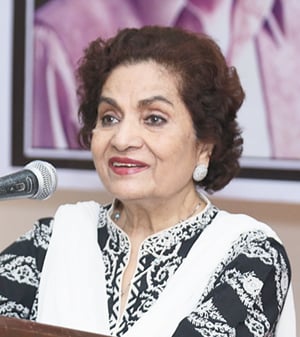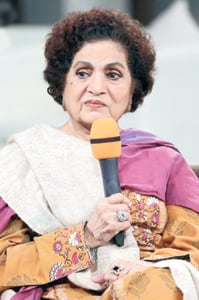This week You! talks exclusively to celebrated scriptwriter Haseena Moin who shares her views about her bold female characters - centered upon empowering women and giving them the due respect and value they deserve in society...
This week You! talks exclusively to celebrated scriptwriter Haseena Moin who shares her views about her bold female characters - centered upon empowering women and giving them the due respect and value they deserve in society...
One leading name behind successful drama serials of yesteryear, Haseena Moin, needs no introduction.  From ‘Ankahi’, ‘Tanhaiyaan’ and ‘Kiran Kahani’ to ‘Dhoop Kinaray’, ‘Aahat’, and ‘Shehzori’, Moin has penned down the scripts for most notable plays of that time. All of the aforementioned plays were modern in their approach, having little or no regression, and left a strong mark on viewers who remember her work even today. But what is it that sets Haseena Moin apart from other scriptwriters, not just in those days but even in this day and age? This week You! talks exclusively to ace scriptwriter Haseena Moin and finds out her views about her female characters and the current state of Pakistani television...
From ‘Ankahi’, ‘Tanhaiyaan’ and ‘Kiran Kahani’ to ‘Dhoop Kinaray’, ‘Aahat’, and ‘Shehzori’, Moin has penned down the scripts for most notable plays of that time. All of the aforementioned plays were modern in their approach, having little or no regression, and left a strong mark on viewers who remember her work even today. But what is it that sets Haseena Moin apart from other scriptwriters, not just in those days but even in this day and age? This week You! talks exclusively to ace scriptwriter Haseena Moin and finds out her views about her female characters and the current state of Pakistani television...
Haseena Moin’s narratives centered upon empowering women and giving them the due respect and value they deserve in society. She may not be an outright advocate of women’s rights but her writings had the power to empower women. At a time when most women used to be confined in their houses and being a working woman was a big deal, Moin brought to life plays that showed women as progressive characters who have an identity of their own.
When asked about her inspiration behind creating such progressive and realistic characters Moin says, “I always tried to portray bold and courageous women who would never tolerate anyone’s nonsense because I believe women should be like that. I was the kind of girl that I portrayed in most of my plays. The environment I grew up in taught me that women have their own individual identity and a distinct personality that should not be ignored. Hence, all my characters especially women are strong minded.”
Her writings make one wonder if she was part of a women’s rights movement or some similar initiative that made her portray women who have a voice. “I have not been a part of any such movement,” she responds.
“I read a lot and have always been a literature lover. While I was reading our Urdu literature, I realized that women are quite suppressed in our part of the world. I fail to understand how a woman tolerates disrespect. Despite putting in so much effort into making a household and taking care of her husband and children, she is the one who becomes the victim of physical and verbal abuse. We, my sisters and I, used to say to our mother that it is just not possible in real life. And the strange part is that women are expected to stay quiet and face such circumstances with patience and those who achieve that are considered great. This seemed highly unfair. So, I deliberately attempted to portray young girls as educated and bold individuals. If they are leaving their homes for work or education purposes, they should be strong enough to deal with unpleasant situations that may confront them while they are out,” stresses Haseena Moin.
Reflecting on what shaped her dramas the way they were, Moin states, “Your upbringing, your surrounding and the environment you receive education in make all the difference to your character and personality. And if one is gifted with the ability to make sensible choices, then it is not difficult to look at things the way they should be and not how the society wants them to be. The kind of atmosphere I had at home and the environment I grew up in, helped me create characters that were realistic and believable.”
Moin also speaks about the way she paid particular attention to characters and their development, something which is rare in dramas that are dominating our TV screens these days. “I have always emphasized on character development in my plays and gave life to my them,” she maintains, reminiscing the infamous Kutbuddin ‘Kabacha’ that Behroze Sabzwari played in ‘Tanhaiyaan’. “Not only this, the famous character of ‘Akka Buaa’ was a reflection of the lady who used to make my hair while I was very young,” adds Moin.
However, it is unfortunate that even today, almost three decades later, our television screens are dominated by depressing stories of victimization and abuse that have nothing but regression to offer to the viewers. There was a time when TV plays were fewer compared to now but those few stories had an impact on viewers. They not only entertained the audience but also made an attempt to inform them about different cultures around the region.
 Sharing her views on the current state of drama serials, Moin observes, “It is quite sad to see that whatever I wrote at that time, around 40 years ago, becomes ineffective now. Instead of progressing and becoming better, we are going backwards. Dramas that are being made today portray women as weak, helpless individuals who are always weeping or are depressed. I am surprised to see that all the channels, which are apparently so advanced, are quite regressive in their portrayal of women. They are conveying that it is so easy to disrespect women; you can slap her, kick her out of the house whenever you want. This doesn’t happen in our society, at least not in decent families. Why are they showing extra-marital affairs openly onscreen? Even if this is happening around us, they are encouraging it by presenting it and then not even providing a solution for it. Once something appears on television, it is no longer considered taboo. People who are not very strong minded will indulge in such affairs, thinking that they can easily get away with them. Even comedy plays have become too vulgar these days to watch with families. And this is because there is no script editor at any channel to see if there’s anything objectionable in the script. We used to have them at PTV in the early days.”
Sharing her views on the current state of drama serials, Moin observes, “It is quite sad to see that whatever I wrote at that time, around 40 years ago, becomes ineffective now. Instead of progressing and becoming better, we are going backwards. Dramas that are being made today portray women as weak, helpless individuals who are always weeping or are depressed. I am surprised to see that all the channels, which are apparently so advanced, are quite regressive in their portrayal of women. They are conveying that it is so easy to disrespect women; you can slap her, kick her out of the house whenever you want. This doesn’t happen in our society, at least not in decent families. Why are they showing extra-marital affairs openly onscreen? Even if this is happening around us, they are encouraging it by presenting it and then not even providing a solution for it. Once something appears on television, it is no longer considered taboo. People who are not very strong minded will indulge in such affairs, thinking that they can easily get away with them. Even comedy plays have become too vulgar these days to watch with families. And this is because there is no script editor at any channel to see if there’s anything objectionable in the script. We used to have them at PTV in the early days.”
While conversing with her, this scribe felt that she had distanced herself from current TV plays that gained immense popularity among the masses. She had not watched even the most popular and successful series, generalizing all current content to being substandard and offensive.
Moin stopped writing due to health issues and other personal engagements. However, she plans to write more now. She has recently written the script for Danish Taimoor’s upcoming film, ‘Sacch’, which is about familial ties and the relationship between parents and their sons. Besides, she is working on a few scripts for television, a project with Sajid Hassan and an autobiography is also in the pipeline.
We wish to see more of her work on the small as well as big screen and hope she continues to create iconic characters in the near future.